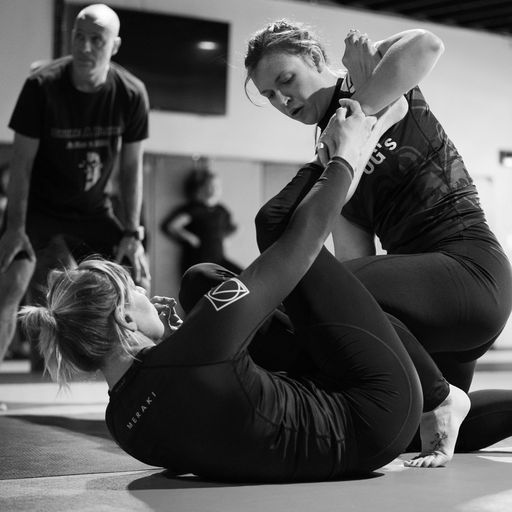
I started crying on the way to my first jiu-jitsu tournament.
It was the first time I was competing in the sport, and although it was an unofficial competition — a no-gi rollathon held at a local gym, nothing that will go on my record as a jiu-jitsu athlete — I was unbelievably nervous.
While I was driving, I thought about all I knew about jiu-jitsu up until that point. Jiu-jitsu is a highly technical sport, and the first few years have a notoriously steep learning curve. There are hundreds of techniques to master, many of which run counterintuitive to our natural instincts. In any other sport, for example, laying on your back with your opponent towering over you would be a terrible position. But in jiu-jitsu, playing guard — a position where one person has their back to the ground while attempting to control their opponent with their legs — is extremely advantageous. There are so many things like this to learn and remember early on.
I didn’t feel ready for the tournament, but I knew that being ready wasn’t the point. The only way I could expect to get better was to try my best and learn from the experience.
In jiu-jitsu, there is a saying that I love: “You either win or you learn.” Competition is promoted as a way to test your abilities, and losing is viewed as a chance to improve specific aspects of your game as opposed to a shameful mark on your record. For example, if you keep getting your guard passed in competitions, you learn pretty quickly that you need to work on maintaining your guard. Competing is an efficient way to assess where you’re at and determine what to put your energy into in regular training.
I knew all this, yet the closer I got to the gym, the more I started to feel like I’d swallowed a jar full of butterflies. The actual cause of this feeling is the adrenaline the body releases when we feel anxious or stressed. Adrenaline reduces blood flow to the stomach and redirects it to the limbs to help us fight or run away in a high-threat situation (hence the term fight-or-flight). I tried to tell myself that this was a good thing to feel — after all, I was about to fight.
But the butterflies got worse, turning more into a hornet’s nest, and before long, I started hyperventilating. I tried talking myself down. After all, there was no pressure on this particular competition. It was just a chance to have fun, learn, and meet other jiu-jitsu athletes. All I could do was give my best.
But that’s when it hit me — what if my best wasn’t good enough? What if I gave my all and came up short?
In the short term, the answer is obvious: keep training. Six months in, I know I’ve only just scratched the surface of all there is to learn about jiu-jitsu. To think I’ve reached my limit is ridiculous at this point. I’ve talked to countless black belt practitioners who have been training for over ten years and still feel they have so much to learn. It’s this opportunity for endless learning, in fact, that makes the sport so appealing to so many people.
But what about the long term? What if, I wondered, I give my all over years — and even after all that time and effort, find out it didn’t add up to much? That my potential is capped at being mediocre?
That’s when the tears started to fall.
The fear of mediocrity — even more than the fear of failure — holds many people from going after their dreams. It’s easier to say you could have been great if only you’d tried than to put in the work and fall short of your own expectations. Failing spectacularly is one thing, but fizzling out because you’re more average than you thought? That’s a reality many of us can’t wrestle with. Not trying in the first place is a way of protecting ourselves from finding out that we might not be special after all.
This is where Jeff Bezos’ regret minimization framework can be useful. Regret minimization works like this: when you find yourself wondering if something is worth trying for or not, ask yourself this question: “At the end of my life, will I regret not having done this?” If the answer is no, you’re better off putting your time and energy into something else. But if the answer is yes — or even probably — you should go for it.
Trying might be the scarier of the two choices, but it’s the one that leads to the least amount of regrets later.
As I pulled up to the gym, I parked and thought about my jiu-jitsu journey so far. I loved the sport, yes — but more than that, I wanted to see what I was made of if I gave it everything I had. Would I regret not giving my all? I looked at myself in the mirror as I briefly considered the question. The answer was a resounding yes. I’d rather fail — or even just do OK — than face the regret of not trying later.
Wiping the tears from my eyes, I took a deep breath and walked toward the gym, determined to give my best.


